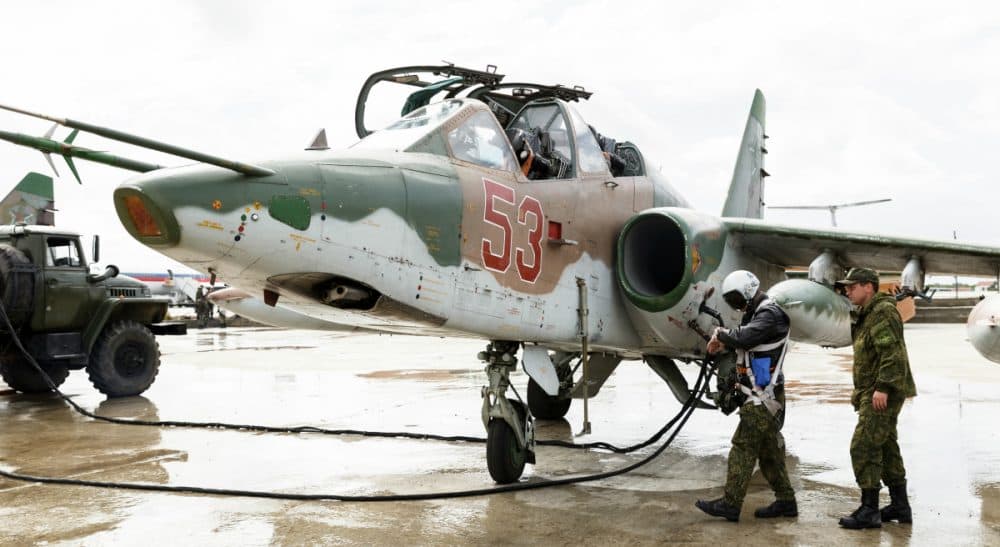Advertisement
With Syria Pull-Out, Russia Scores Its First Win In The New Cold War

In a surprise announcement this week, Russia declared it would be pulling its forces out of the fight against ISIS in Syria. The withdrawal, which is underway, will bring to a close the brief era of cooperation between Moscow and the West. Unfortunately, what the West paid for that cooperation will last a lot longer than the cooperation itself.
While we in the United States were worried about the back and forth between the formerly hopeful Mitt Romney and the hopefully former Donald Trump earlier this month, Russia secured an important and seemingly lasting first victory in their self-declared new Cold War.
While the West focused on ISIS, the U.S. and the EU allowed Russia to establish a stronger foothold in Eastern Europe.
In a speech at The Hague, the president of the European Commission, Claude Juncker, said that Ukraine will not join the EU or NATO for at least another 20 to 25 years. Juncker, who is effectively the head of the EU, didn’t provide a reason behind the new timeline, leaving many analysts, including this one, to speculate.
First, some context. The Netherlands is holding a referendum next month on a pending Ukraine-EU free trade deal. Juncker’s comments were meant to assuage Dutch concerns that this deal is the first step towards EU membership for Ukraine.
Even if this were a step towards joining the EU, it’s not the first. In late 2013, the Ukrainian government announced that it would not implement an agreement between its country and the EU. This led to a mass-uprising, the overthrow of Prime Minister Viktor Yanukovych and Russia's annexing then-Ukrainian Crimea.
On the surface, the ongoing instability in Ukraine and the relative economic fragility of the European Union make integration very risky. A free trade agreement, along with the association agreement that touched off the Ukraine crisis, give the appearance that EU membership is not far off for Ukraine. Dutch voters aren’t crazy for being wary.
However, of the two ways that Juncker could have calmed these fears -- either arguing that Ukrainian integration isn’t as risky as it seems, or that Ukrainian integration isn’t imminent -- Juncker chose the latter in the most severe way possible. Not only is membership in the EU off the table, but NATO is, as well. (On this last point, Juncker has questionable jurisdiction).
And it’s not just on hold until the country’s situation settles down and the instability the Dutch fear subsides; it’s on hold for 20 to 25 years, which is an eternity in geopolitical time. The relevance and viability of the European Union get called into question almost annually (most recently with the upcoming U.K. referendum). It is, therefore, not unlikely that Ukraine will find itself holding the current equivalent of a gift card to Chi-Chi’s.
Why did Juncker choose this path? My guess: The audience for the EU Commission president's message is sitting a lot farther east of Amsterdam.
The result? Moscow’s strategy has paid off in one of two ways:
It's possible the strategy to cooperate with the West in Syria has paid dividends. By demonstrating that their capabilities are an indispensable part of the overall strategy against ISIS, Russia has bought itself some leeway in other areas lower on the Western list of priorities. One is the West’s standoffish approach to Russia’s ongoing attacks on Ukraine. Another is Russia's diplomatic attempts to regain influence in Eastern Europe, exemplified by the recent air defense pact that Moscow concluded with Armenia. It has similar agreements pending with Kyrgyzstan and Tajikistan. NATO and the EU are willing to push off Ukraine membership indefinitely as long as Russia keeps (mostly) playing ball, because defeating ISIS is more important than stopping Russia’s expansion along its western frontier.
From the start, Russia pursued its own agenda and refused to cooperate with the West’s strategy against ISIS. Now they’re leaving early, before ISIS is defeated...
Or, indirectly, Moscow’s strategy of deterrence through uncertainty has caused this seeming appeasement. Though it no longer graces headlines here in the U.S., the instability Russia has created in Ukraine shows no sign of fading. It has possibly made the Dutch and others afraid that if they were to further provoke Moscow by embracing Ukraine, it might set off a refugee crisis at best. At worst, further incursion into a now-NATO/EU member state in Ukraine would pull Europe into another war. The European public couldn’t stomach such an outcome, and their economies couldn’t weather it.
Somehow, the story of Ukraine’s delays fell through the cracks, even though that story invokes some favorite American fear-mongering keywords: appeasement and Cold War. While the West focused on ISIS, the U.S. and the EU allowed Russia to establish a stronger foothold in Eastern Europe. The decision was a conscious assessment of priorities and costs.
However, the results are an indictment of how incorrect that assessment was. Ukraine is in limbo for another generation, and Russia’s goal to regain its lost dominance over Eastern Europe seems even more attainable. That part was correct.
But that trade off was made assuming Russia’s entry into Syria would produce benefits that outweighed what the West gave up. From the start, Russia pursued its own agenda and refused to cooperate with the West’s strategy against ISIS. Now they’re leaving early, before ISIS is defeated, and after the West has already given up Ukraine.
One is left to wonder: Did the U.S. and the EU get what they paid for?
